- Home
- Andrew Wareham
Red Man Page 3
Red Man Read online
Page 3
The morning saw the pair on their way south, still walking their horses, in no great hurry. The magistrates had issued no warrant, had made no attempt to take them up and there was no need to escape their jurisdiction. It seemed likely that the town was far more inclined towards Parliament than were the local landowners. It was to be in part a war between the prosperous of the countryside and the new money of the towns, he suspected, as well as a simple clash between King and Parliament, the Old Religion and the new.
He shrugged – he knew which side he was on and the finer points could escape him. He was an ordinary man and the gentry were not his people.
Two days later and he was in a room in an inn towards the centre of London, amazed and horrified by the huge metropolis, a hundred times greater than York, or so it felt.
To a country youth, York had seemed vast, requiring a good twenty minutes to walk from one side of town to the other. He had ridden two hours through the villages and then the streets of London and was sure he was no more than in its middle parts. He doubted he could ever come to know so enormous a city, was not at all sure he wished to.
Like any town, London was dirty and smelly, but seemed to take its stench to extremes. In York and Stamford the night-soil carts collected the contents of chamber pots and took them out to the fields, which were within reason close to hand. In much of London, the fields were hours away and the night-soil carts had been abandoned as impractical. Where there was a sewer, it was overused. The few streams and rivers running down to the Thames were thick with sewage. The Thames itself was disgusting.
Micah could not imagine how people could choose to live in such a place. He promised himself to drink beer only – it was far safer than the water could possibly be.
He made enquiries at his inn and was directed to the Old Artillery Gardens in Spitalfields, within close smell of the Thames, in the expectation of finding Philip Skippon and giving him the letter he carried from Major Holdby. He knew the Sergeant Major General to be an eminent gentleman and expected to have to wait long hours to be admitted to his presence.
He was face to face with Skippon within minutes.
“I have many hours to work on my papers, Lieutenant Slater, and can always find time for the boys who will come to me.”
Micah later discovered that it was Skippon’s unvarying habit to call soldiers his boys.
“I am come from Stamford, sir, and have a letter from Major Holdby, who was known to you in the Germanies, I believe.”
“He was indeed, Mr Slater. A fine young soldier, too. Allow me to peruse your letter.”
Micah stared at the great soldier while he waited, taking in the lean face of the saint, no spare flesh at all, yet not a forbidding countenance. There was a twinkle to the blue eyes that said Skippon enjoyed life.
“Major Holdby displays a deal of liking and respect for you, Lieutenant Slater. He says that you are a soldier born, a fighting man of the finest kind. He is not a man to overstate his case.”
“If I am a soldier at all, sir, it is for Major Holdby making me. I have the greatest respect and kindness for him.”
“As have I. A good man as well as a soldier. He commends you to me, begs that I might employ you to train the people of London in the conflict that is to come upon us. He says that you have fought against the Scots and shown bloody handed there. He says as well that you have dealt with miscreants and malignants in Stamford town and displayed great restraint wherever possible. I have no use for the man of blood who is a stranger to the arts of peace, Lieutenant Slater. In the same way, the man of peace who shrinks from war is no friend of mine. It seems to me that you might well be of the sort that I have an affection for – one who can offer violence to the enemy who comes sword in hand and kind words to those who would argue and differ peaceably. We are close to war, Lieutenant Slater, of the worst kind – brother against brother, father against son – and we need men who will refrain from killing when possible and slay implacably when there is no other course. I will take you willingly, Lieutenant.”
“I believe, sir, that I shall be pleased indeed to follow you to war. I have no love for killing, sir, but know that I can perform the bloody act when I must. I would wish to stand at the shoulder of a man who will not lightly command the death of others.”
“So be it, Mr Slater. You have your letters and numbers, I presume?”
“Both, sir, sufficient at least for the demands of my company. I was for some months the sole officer to hand and was forced to keep the company’s ledger and I know that the captain who eventually came was satisfied with my work.”
“Good! Too few of my officers can hold a pen with the facility that they use a sword, yet both are essentials of war. I shall make use of you, Lieutenant Slater. For the while, we have quarters at the Merchant Taylor’s guildhall and I would have you move into a room there. The lodgings will cost far less than any inn, which is also a recommendation for them.”
Micah had been amazed at the cost of a chamber in London, was happy to move into barracks.
“I would caution thee, Mr Slater, that not all of the officers of the Honourable Artillery Company support Parliament in its dealings with the King. A degree of discretion might well be wise. Captain Holdby says that you left Stamford following a meeting with a Yeomanry officer who had insulted your sister?”
Micah recounted the meeting briefly.
“Killed him at second shot? Well done, sir. An offensive brat, it would seem, and the world a better place for his absence. I have no patience with those who will roister and bully, Mr Slater, and have no objection to your dealing with them in so condign a manner. That said, a soft answer may often turn away the wrath, as the Good Book says, and brawling is better avoided when possible.”
“Proverbs, sir, 15.1. I was warned much as a boy for my red hair and its proclivity to brawling and brangling. When possible, sir, I shall offer a meek tongue.”
“I ask no more of any man, Mr Slater. You will not, of course, tolerate insult to your honour or that of any other of our cause.”
Micah laughed and shook his head.
“I am a soldier, sir, and I do have a red head, when all is said.”
“Indeed, Mr Holdby, my old companion in arms, says that they call thee Red Man, in the regiment. I will not ask you to change your nature. I will be pleased to introduce you to your fellows at our dinner tonight, sir.”
It was as Red Man that Skippon introduced him to the officers that night, named, he said, for his nature as well as his looks.
“The young man was prominent, I am told, in the pacification that followed the ending of the war with the Scots, assisting much in the removal of those who had turned to brigandage.”
The officers were sat in two groups, one far larger than the other and clearly more inclined to drink small beer than wine and of a more sober habit of dress. Both sets, Parliamentarian and Royalist, approved of any soldier who had put down the looters and despoilers of the countryside who flourished in the discord of war.
“Who was your commander, Red Man?”
“Captain, now Major, Holdby, who had the Lincolnshire Trained Bands in his command. We were drafted thence into Colonel Knighton’s Regiment of Foot and sent to Stamford to keep the peace and recruit to our ranks.”
“And did you keep the peace there, sir?”
The question came from the Royalist ranks, a young man and dressed fashionably with lace and ribbons.
“We put down any who sought to arm themselves and cause dissension in the town, sir.”
“Even though they might have been loyal men and about to defend His Majesty?”
“Any and all who would have brought bloodshed into the streets, irrespective of cause. The great bulk of the ordinary people seem to have little either of knowledge or interest in any cause other than that of living a peaceful life and feeding and rearing their children. It seems to me that the people of town and village have the right to live their own lives, without their betters, so-called,
destroying their simplicity.”
“Every man has his duty to his King. That is preeminent.”
“That is one point of view, certainly, sir. In a busy town such as London, it may well be true. In the distant parts of land where people live far from dispute and politics, it is another matter.”
Skippon intervened to say that every man had a right to think his own thoughts and discuss them, but not perhaps at the dinner table.
They withdrew from the table and the bulk of those present wandered into a great hall which had been made over to the officers as a common room, a mess, as some called it.
The Royalist faction were none of them to be seen.
Skippon sat next to Micah for part of the evening.
“Those of the King’s faction choose to pursue noisier forms of relaxation of an evening, Red Man. They will be off to the theatres, to the inns, and, I much regret to say, to bawdy houses as well. They sin casually and often with no regard for their mortal souls. We take simpler pleasures, discussing much that should be of interest to all men and addressing ourselves to the condition of our souls.”
It sounded as if the Royalists were having the more enjoyable evening.
A little later a familiar face came and sat at Micah’s side.
“Are you not Captain Carew, sir? I met you in Major Holdby’s company, as I recall, your own troops cashiered for lack of zeal in battle.”
“Just so. I came to London and found work here with the most willing of young men, anxious to learn the pike and musket to defend their homes and their liberty. I am to take you as my second officer, if it suits you, Red Man.”
Micah assured Carew that he would be grateful to serve under the command of one of Major Holdby’s friends.
“I have one young ensign besides you, Lieutenant. He is a lawyer by trade and hales from the parts close to Stamford. His name is Charles Tixover.”
Micah was displeased by that information.
“His late father was Squire of my village of Collyweston. I never saw the son, the family living away from the village. The old gentleman raised the trained band in the village and showed discomfited when they with one accord cleaved to chapel and Parliament rather than the King as he wanted.”
“He died, you say?”
“He did – he chose to ride north to Newark, a distance greater than one might achieve in a day, leaving our barracks in Stamford in late afternoon. He was not seen again. We do not know but suspect he came across deserters from the King’s army against the Scots, making their way slowly back to the South country. There have been acts of villainy in the countryside, attributed to such folk. I suspect he is at the bottom of a deep ditch somewhere, stripped of his all, his horse the possession of one of the brigands.”
“Foolish of him, Red Man.”
“He would not be told, Captain – he insisted on going his own way in all things.”
“So be it. I am Daniel by name, Red Man. I have not earned a soubriquet such as yours.”
Micah gained the impression that Carew had not believed his story, and that he cared little what might have happened to a squire who would have raised men for the King.
“What of young Ensign Tixover, Daniel? Who does he stand for?”
“I do not know. Neither, I suspect, does he. He is a pleasant fellow and one who thinks deeply. As such, I am not without hopes that he will join us when the fighting starts. The King has left London, as you will know, and I do not believe he can return except under arms. Many of the Trained Bands know this and there are no few who demand extra training of us. When the day comes, as I suspect it must, I think we will take some twenty thousands to defend the City, of whom perhaps two thousands will be hardy soldiers, the rest willing but fairly much ignorant. There are many veterans of the wars living in London – men who spent a year or two or more in the ranks in the Germanies, putting together a few shillings to set themselves up in later life.”
Micah had heard of mercenaries but had not realised they included ordinary soldiers who had gone out for loot, and often come back with it, or so it seemed.
“More than a few shopkeepers bought their little store and its stock with German silver crowns, or plate from a burgher’s table. As the wars continued so the Germanies themselves lost many of their own young men and their commanders recruited in London and along the East Coast as well as in France and north into the Swedish and Danish lands. There are a few of them who have made the voyage here now that the wars are dying away.”
Micah thought it more likely that the mercenaries would have sought out the King, more to their taste than the psalm singing of those who cleaved to Parliament.
“They are mercenaries, men who sell their swords. Parliament has more money than the King – there would be no Parliament except that his purse is empty.”
“Can you trust such men, Daniel?”
“Of course, provided they are in the front ranks and we have true musketeers behind them.”
Micah was not sure he approved of such cynicism. He did like the idea of having experienced soldiers in their ranks.
“The older men who have come back, Daniel. I am right to suspect they will make good sergeants?”
“The best, I believe.”
Micah discovered the quality of his troops when he joined Carew soon after dawn. Many of the keenest young men – and no few of their elders – took an hour on the parade ground in the morning before starting work for the day.
“We train the beginners in both shot and pike, so that they can take up either weapon at need. Fighting in the streets may well become very untidy, Red Man. I pray it may never come to that.”
“What do you have in mind, sir?”
“Companies of pikes shoulder to shoulder and blocking a road against horse and foot until the artillery is brought up, then to vanish into the alleyways and the shot to take over, from the windows of the shops and taverns and houses lining the roadway. Where the enemy presses hard down a road, to fall back and allow them entry and then to rise from the windows to the side and assail them mightily with shot. So doing, we overcome any advantage of numbers they possess and also negate their skills. The young gentlemen may be our masters in terms of horsemanship, but they will not outride us on the cobbles if we use our skills sensibly.”
A hundred or so men came together on the ground and sorted themselves out into their ranks, their own sergeants shouting loud and with increasing exasperation.
“Ten minutes to place them in their proper lines, Red Man. It is getting better – last month it took half an hour to remind them of where they stood yesterday. Now, their sergeants will march them in order to collect their pikes and they will stand with them, back in their places.”
The twenty foot pikes were unwieldy weapons, stood together like groves of young poplar trees. It needed careful balancing to keep the pikes upright as the men moved into position.
“There is much argument, Red Man, whether the men should not carry twelve, sixteen and twenty foot pikes in three ranks so the heads are all clustered together.”
“The army sent against the Scots carried them so, sir. I never heard they did any great execution with them.”
“No. I have seen both in the Germanies and am unconvinced by either argument. I had rather see ranks equipped with the flintlock musket – but it costs far too much to be possible. The pike stays until we are rich enough to replace it.”
Micah agreed. He watched as the pikes were lowered to the horizontal, and then raised again while the men were told to do it right next time and not clout the ears of the rank ahead of them.
Eventually, the sergeants were satisfied and the company marched forward, every man to the same pace and holding his pike perfectly steady.
The hour passed and the men took their pikes back to the armoury and dispersed to their places of work, wandering off in groups of three or four and chattering like schoolboys released to play.
“They seem willing to push their pikes, sir. What of standin
g to receive a charge of horse?”
Captain Carew smiled, though with little humour.
“That is the question we always ask, Red Man. We cannot answer it on the parade ground. They are brave young men and willing to enter the fight. Whether they will stay until its end, we do not know. I am inclined to think they will. They are taking a stand for what they believe is right. In their minds, the King is a bully, using his power to grind them down; they do not like bully-boys.”
“As simple as that, you think, sir?”
“I do. They are not all deep thinkers or dedicated men of religion, but they know what is right and believe the King is wrong. I do not think they need a lot more than that. I could wish they were more committed to their training, but many of them are convinced that being in the right will strengthen their arms in battle.”
Micah shook his head. The little of war he had seen much inclined him to the belief that martial exercise might make him stronger but that words would add very little.
“Not to worry, Red Man. Best we should break our fast now. Mr Skippon will demand our assistance later in the morning, in his offices. There is a pastrycook less than a furlong from here who will sell us a pasty and a pint of small beer for a penny, being one of our inclination and wishful to show his loyalty to the cause.”
The pastrycook had a small room set out with tables next to his ovens and a pair of daughters to serve the customers. The room was hot and pleasant – it had started to rain as they walked to it.
Captain Carew was on terms with both girls, talking lightly to each and introducing Micah.
“Red Man, who has come to us from the wars in the North Country to rest his bloody hands before entering his next campaign. Catherine and Jane Bayliss, daughters to the gentleman you see at the ovens.”
Micah rose to his feet and made a short bow, thinking it better to show too much formality than too little.

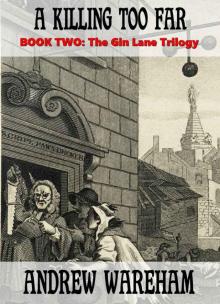 A Killing Too Far
A Killing Too Far Killing's Reward
Killing's Reward A New Place
A New Place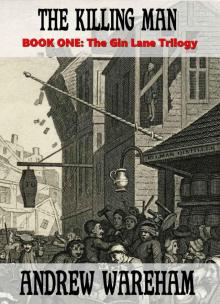 The Killing Man
The Killing Man Bold and Blooded
Bold and Blooded The Breaking Storm (Innocent No More Series, Book 2)
The Breaking Storm (Innocent No More Series, Book 2) Nobody’s Child
Nobody’s Child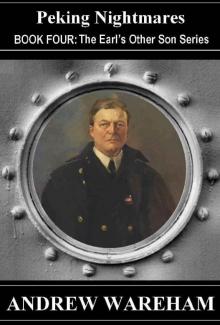 04 Peking Nightmares (The Earl’s Other Son Series, #4)
04 Peking Nightmares (The Earl’s Other Son Series, #4)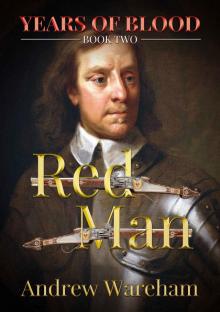 Red Man
Red Man Foreign Mud
Foreign Mud The Gathering Clouds (Innocent No More Series, Book 1)
The Gathering Clouds (Innocent No More Series, Book 1) 06 A Soldier’s Farewell (Man of Conflict #6)
06 A Soldier’s Farewell (Man of Conflict #6)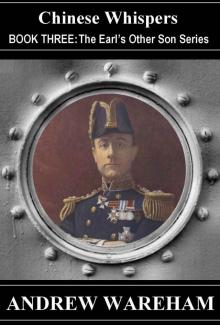 Chinese Whispers
Chinese Whispers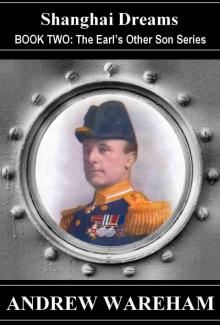 02 Shanghai Dreams (The Earl’s Other Son #2)
02 Shanghai Dreams (The Earl’s Other Son #2)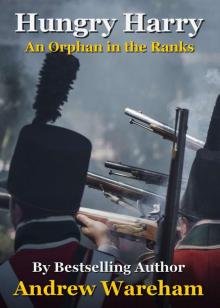 Hungry Harry: An Orphan in the Ranks
Hungry Harry: An Orphan in the Ranks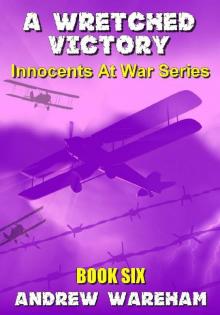 A Wretched Victory (Innocents At War Series, Book 6)
A Wretched Victory (Innocents At War Series, Book 6)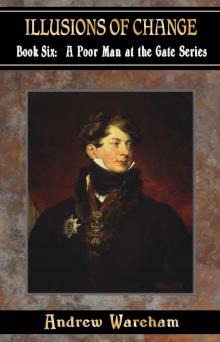 Illusions Of Change (A Poor Man at the Gate Series Book 6)
Illusions Of Change (A Poor Man at the Gate Series Book 6)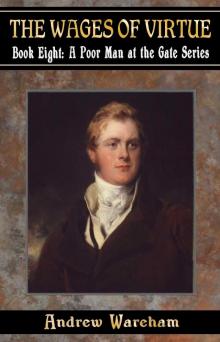 The Wages Of Virtue (A Poor Man at the Gate Series, Book 8)
The Wages Of Virtue (A Poor Man at the Gate Series, Book 8) Blood and Famine (Man of Conflict Series, Book 4)
Blood and Famine (Man of Conflict Series, Book 4) The Friendly Sea (The Duty and Destiny Series, Book 1)
The Friendly Sea (The Duty and Destiny Series, Book 1)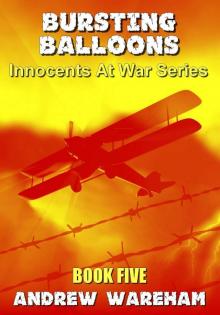 Bursting Balloons (Innocents At War Series, Book 5)
Bursting Balloons (Innocents At War Series, Book 5)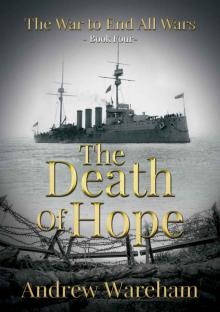 The Death of Hope
The Death of Hope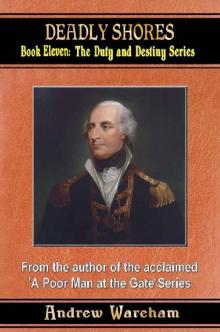 Deadly Shores (The Duty and Destiny Series, Book 11)
Deadly Shores (The Duty and Destiny Series, Book 11)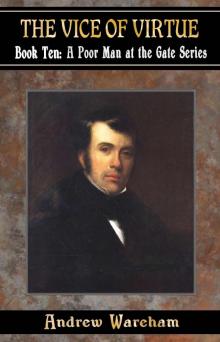 The Vice Of Virtue (A Poor Man At The Gate Series Book 10)
The Vice Of Virtue (A Poor Man At The Gate Series Book 10) Virtue’s Reward (A Poor Man at the Gate Series, Book 11)
Virtue’s Reward (A Poor Man at the Gate Series, Book 11)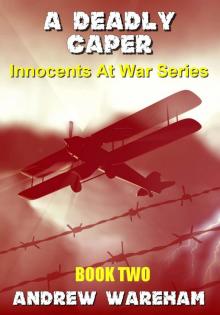 A Deadly Caper (Innocents At War Series, Book 2)
A Deadly Caper (Innocents At War Series, Book 2)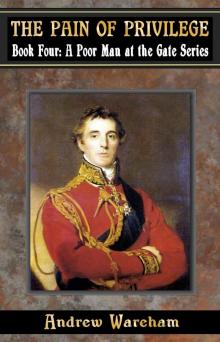 The Pain Of Privilege (A Poor Man at the Gate Series Book 4)
The Pain Of Privilege (A Poor Man at the Gate Series Book 4)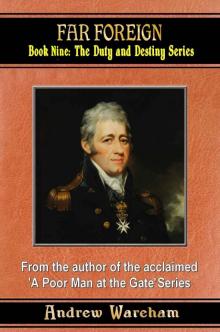 Far Foreign (The Duty and Destiny Series, Book 9)
Far Foreign (The Duty and Destiny Series, Book 9)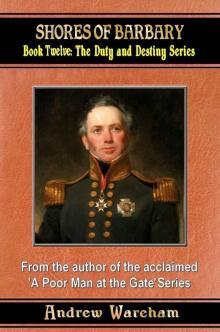 Shores of Barbary (The Duty and Destiny Series, Book 12)
Shores of Barbary (The Duty and Destiny Series, Book 12)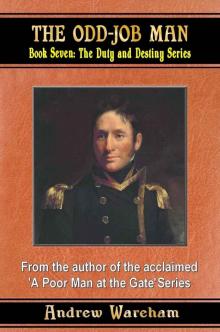 The Odd-Job Man (The Duty and Destiny Series, Book 7)
The Odd-Job Man (The Duty and Destiny Series, Book 7) Fire and Folly (Man of Conflict Series Book 3)
Fire and Folly (Man of Conflict Series Book 3)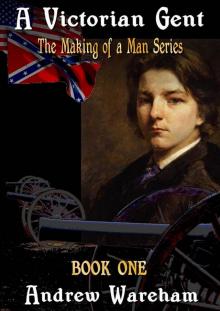 A Victorian Gent (The Making of a Man Series, Book 1)
A Victorian Gent (The Making of a Man Series, Book 1)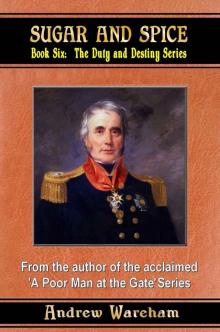 Sugar and Spice (The Duty and Destiny Series, Book 6)
Sugar and Spice (The Duty and Destiny Series, Book 6)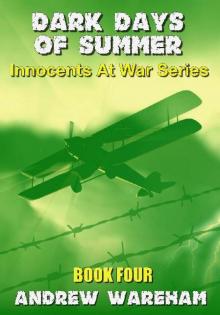 Dark Days Of Summer (Innocents At War Series, Book 4)
Dark Days Of Summer (Innocents At War Series, Book 4)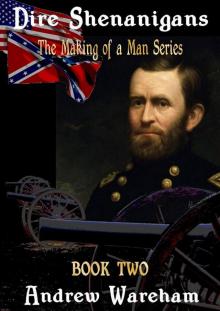 Dire Shenanigans (The Making of a Man Series, Book 2)
Dire Shenanigans (The Making of a Man Series, Book 2)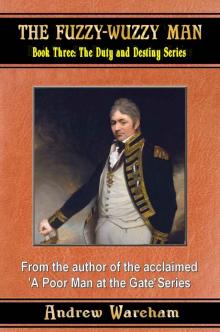 The Fuzzy-Wuzzy Man (The Duty and Destiny Series, Book 3)
The Fuzzy-Wuzzy Man (The Duty and Destiny Series, Book 3)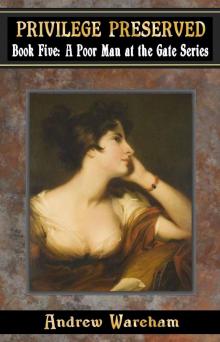 Privilege Preserved (A Poor Man at the Gate Series Book 5)
Privilege Preserved (A Poor Man at the Gate Series Book 5)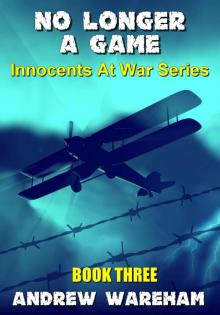 No Longer A Game (Innocents At War Series, Book 3)
No Longer A Game (Innocents At War Series, Book 3)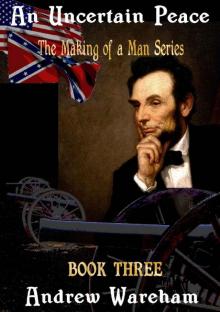 An Uncertain Peace (The Making of a Man Series, Book 3)
An Uncertain Peace (The Making of a Man Series, Book 3)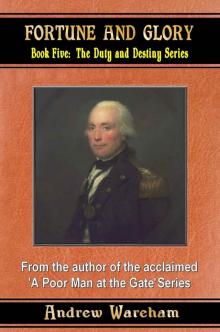 Fortune And Glory (The Duty and Destiny Series, Book 5)
Fortune And Glory (The Duty and Destiny Series, Book 5)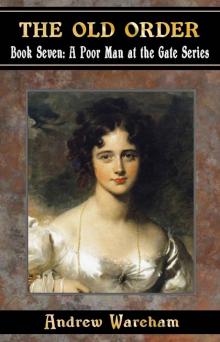 The Old Order (A Poor Man at the Gate Series Book 7)
The Old Order (A Poor Man at the Gate Series Book 7) A Place Called Home (Cannibal Country Trilogy, Book 2)
A Place Called Home (Cannibal Country Trilogy, Book 2) Nouveau Riche (A Poor Man at the Gate Series, Book 2)
Nouveau Riche (A Poor Man at the Gate Series, Book 2) The Privateersman (A Poor Man at the Gate Series Book 1)
The Privateersman (A Poor Man at the Gate Series Book 1)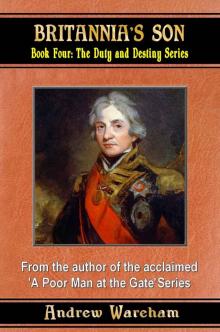 Britannia’s Son (The Duty and Destiny Series, Book 4)
Britannia’s Son (The Duty and Destiny Series, Book 4) Long Way Place (Cannibal Country Trilogy, Book 1)
Long Way Place (Cannibal Country Trilogy, Book 1) Spanish Tricks (Man of Conflict Series, Book 5)
Spanish Tricks (Man of Conflict Series, Book 5) A Parade Of Virtue (A Poor Man At The Gate Series Book 9)
A Parade Of Virtue (A Poor Man At The Gate Series Book 9)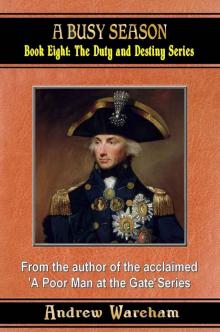 A Busy Season (The Duty and Destiny Series, Book 8)
A Busy Season (The Duty and Destiny Series, Book 8) Billy Bacon and the Soldier Slaves (Colonial Warrior Series, Book 1)
Billy Bacon and the Soldier Slaves (Colonial Warrior Series, Book 1) Raging Rajahs (Man of Conflict Series, Book 2)
Raging Rajahs (Man of Conflict Series, Book 2)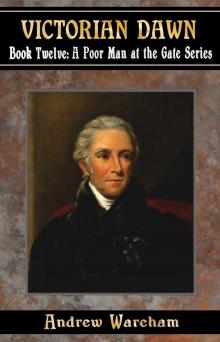 Victorian Dawn (A Poor Man at the Gate Series, Book 12)
Victorian Dawn (A Poor Man at the Gate Series, Book 12) Born To Privilege (A Poor Man at the Gate Series Book 3)
Born To Privilege (A Poor Man at the Gate Series Book 3)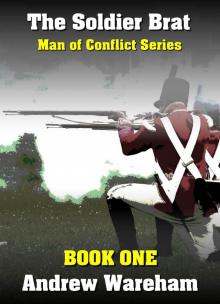 The Soldier Brat (Man of Conflict Series, Book 1)
The Soldier Brat (Man of Conflict Series, Book 1)